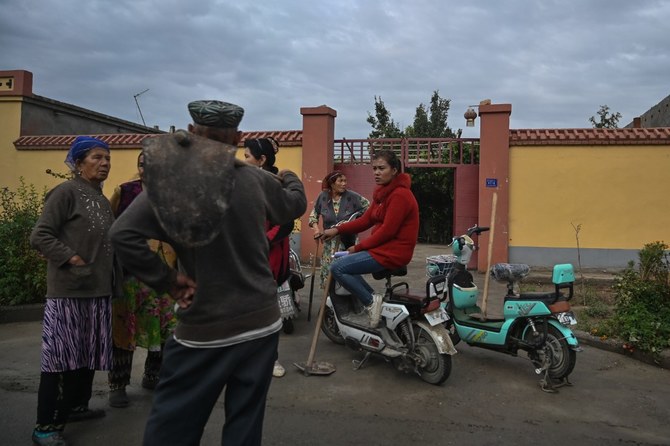After Xinjiang, is Hong Kong next?

In a bid to assure the Chinese communist party’s (CCP) longevity and unquestioned authority, the mass detention of Uighurs in “re-education” camps, since 2014, may just contain the seeds of Beijing’s unraveling.
China, in the eyes of President Xi Jinping’s cabal, is a unified, homogenous state of some 1.4 billion people that prizes conformity and total obeisance to the absolute authority that is the CCP.
To that end, a brutal crackdown on the mostly Muslim Uighurs, Kazakhs, Uzbeks and other minority ethnicities in the Xinjiang Autonomous Region (XAR) is warranted — as confirmed by a leak of 400 pages of speeches, directives and orders by Beijing’s top brass.
The contents of the leak, detailed in a New York Times report, were already known, they just lacked unfiltered and un-redacted corroboration from Beijing.
In short, the Uighurs had failed to meet the benchmark of the CCP’s post-1949 ideals of homogeneity. As a result, Beijing was to show “absolutely no mercy,” employing the “organs of dictatorship” to launch an “obliterating offensive” against “terrorism, infiltration and separatism” in Xinjiang.
Under Xi, the obsessive fascination with maintaining the CCP’s grip on power has translated into the Sinicization of religion to align the five recognized faiths — Buddhism, Daoism, Islam, Catholicism and Protestantism — with the party’s officially atheist doctrines. At the core of this doctrine is a paranoia that foreign elements could utilize religion to spur separatism, and in the XAR’s case, it is evinced by the presence of the Muslim separatist group, the East Turkestan Islamic Movement (ETIM).
This umbrella group of splintered cells — named on the US State Department’s main list of foreign terrorist organizations — has long sought the formation of an independent state of East Turkestan, carved from parts of Turkey and Central Asia, including the XAR. The ETIM has, in the past, claimed responsibility for a series of terrorist attacks in several Chinese cities. Yet, the movement is just one aspect to this multi-faceted conundrum, which Beijing is seeking to solve via forced integration, mass detentions, torture and abuse in the XAR.
Xinjiang became a province in the last years of the Qing dynasty and briefly achieved sovereignty twice before the end of the Chinese Civil War in 1949. Uighurs are the majority ethnicity in the XAR and practice Sufi Islam, a big factor in the ethnic group’s disdain for Beijing’s attempts at forced assimilation.
The shocking revelations should alarm the global community that has largely demurred on criticizing Beijing for its activities in the XAR
Hafed Al-Ghwell
Nonetheless, the narrative that Uighurs subscribe to a separatist ideology, spurred by their Muslim faith is mostly wrong since views on the subject are mixed among the Uighurs. While some relish a separate state, others simply prefer remaining culturally distinct and maintaining an autonomous rapport with China. There are also those that welcome integration altogether. Granted, there are a number of separatist organizations in the XAR but many of them are not radical like ETIM and proscribe violence.
Yet, to Beijing, the existence of these separatist elements in addition to demonstrations in the XAR and violent altercations in other parts of mainland China (involving Uighurs), “justified” resorting to such drastic measures.
Wang Yang, now chairman of the Political Consultative Conference and one of the CCP’s most senior “liberal” elites, warned that if Beijing did not reform its ethnic minority policies, the country (and the party) would face more difficulties beyond spurts of violence and protests.
A chief CCP concern is that the failure to mitigate rising tensions in the XAR (and with Uighurs elsewhere in mainland China) would inflame latent separatist sentiments or movements in other parts of China, namely Hong Kong.
In essence, Xinjiang became a ticking time bomb, one which Beijing hoped to defuse by, at first, incentivizing the resettlement of majority Han-Chinese in the region. Unfortunately, that only served to escalate tensions further, leading to the appointment Chen Quanguo, the current secretary of Xinjiang’s Communist Party — notorious for the “successful” Chinese crackdown in Tibet and intensifying the state’s control of Buddhist monasteries there.
His appointment in 2016 was followed soon after by a $2.9 billion increase in spending, which largely went to expanding the network of detention camps in Xinjiang as well as intensifying state security operations under newly appointed security chief, Zhu Hailun.
The appointment of Quanguo and his ilk, was not surprising as it is typical of Beijing’s disdain for reforming away from conformity, a chief CCP tenet, as confirmed by Xi’s reaffirmations of “One China” during the country’s 70th anniversary celebrations last month.
Instead, the CCP’s obsession with not repeating “mistakes” other countries made only leads to one regrettable outcome — brutal, systematic repression.
The leaked 400 pages read like a playbook straight out of Stalin’s Soviet Union in the 1930s, complete with numerical targets for Uighur detentions and purging of officials who did not demonstrate sufficient zeal for the crackdown.
Chillingly, Beijing urges party officials to emulate aspects of America’s War on Terror in its repression of the Uighurs. Relatives and children of detained Uighurs are expected be grateful, assured that the party will take care of them. If not, there are not-so veiled threats included in the guide used by Chinese officials to explain the camps.
The suggestion that China’s prosperity could somehow temper separatist zeal in the XAR is thrown out right away in some of the CCP’s cold calculations detailed in the leak. Officials point to the fall of Yugoslavia as compelling evidence that economic prosperity alone will not dissuade talk of secession or greater autonomy. It also predicts that the CCP has no intention of caving to the ongoing protests in Hong Kong fueled by unprecedented communist party encroachment and anti-mainlander sentiment.
The semi-autonomous region has benefitted enormously from China’s rapid economic growth and accumulation of wealth, unlike the XAR, which remains sparsely populated despite being home to China’s largest coal and natural gas reserves.
The shocking revelations, courtesy of a member of China’s political establishment, should alarm the global community that has largely demurred on criticizing Beijing for its activities in the XAR, especially majority Muslim nations. The usual dismissals of reports by humanitarian organizations or first-hand accounts from escapees no longer work. The leaked pages augur a dark future for other separatist movements, e.g. Inner Mongolia, Hong Kong and Tibet, looking to be split from the CCP’s hegemony or, like Taiwan, staying cleaved from Beijing completely.
Hong Kong’s protest movement is now painted with the same allegations of foreign interference, terrorism and infiltration, which Beijing has already used to justify its actions in the XAR.
These revelations concerning Xinjiang are a wakeup call for the world to prize human rights over placating Beijing, to maintain access to Chinese markets, capital, and investments, or simply reap the windfalls from a completed Belt and Road Initiative (of which the XAR is an integral part).
Failure to do so, will mostly likely embolden a now unchecked CCP to initiate a heavy crackdown in Hong Kong, much like what has already happened in Tibet and is happening in Xinjiang. At what point does the world draw the line?
• Hafed Al-Ghwell is a non-resident senior fellow with the Foreign Policy Institute at Johns Hopkins University’s School of Advanced International Studies. He is also senior adviser at the international economic consultancy Maxwell Stamp and at the geopolitical risk advisory firm Oxford Analytica. Twitter: @HafedAlGhwell










































